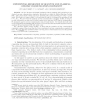11 search results - page 1 / 3 » Quantum Communication Cannot Simulate a Public Coin |
CORR
2004
Springer
13 years 4 months ago
2004
Springer
We study the simultaneous message passing model of communication complexity. Building on the quantum fingerprinting protocol of Buhrman et al., Yao recently showed that a large cl...
COCO
2005
Springer
13 years 10 months ago
2005
Springer
Consider a two-party quantum communication protocol for computing some function f : {0, 1}n × {0, 1}n → Z. We show that the first message of P can be compressed to O(k) classi...
ICQNM
2008
IEEE
13 years 11 months ago
2008
IEEE
Coin flipping is a cryptographic primitive in which two spatially separated players, who in principle do not trust each other, wish to establish a common random bit. If we limit ...
IPL
2006
13 years 4 months ago
2006
We investigate the randomized and quantum communication complexity of the HAMMING DISTANCE problem, which is to determine if the Hamming distance between two n-bit strings is no l...
STOC
2004
ACM
14 years 5 months ago
2004
ACM
Abstract. We give the first exponential separation between quantum and bounded-error randomized one-way communication complexity. Specifically, we define the Hidden Matching Proble...

